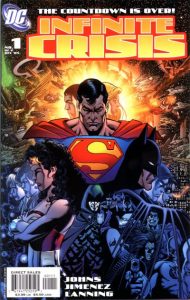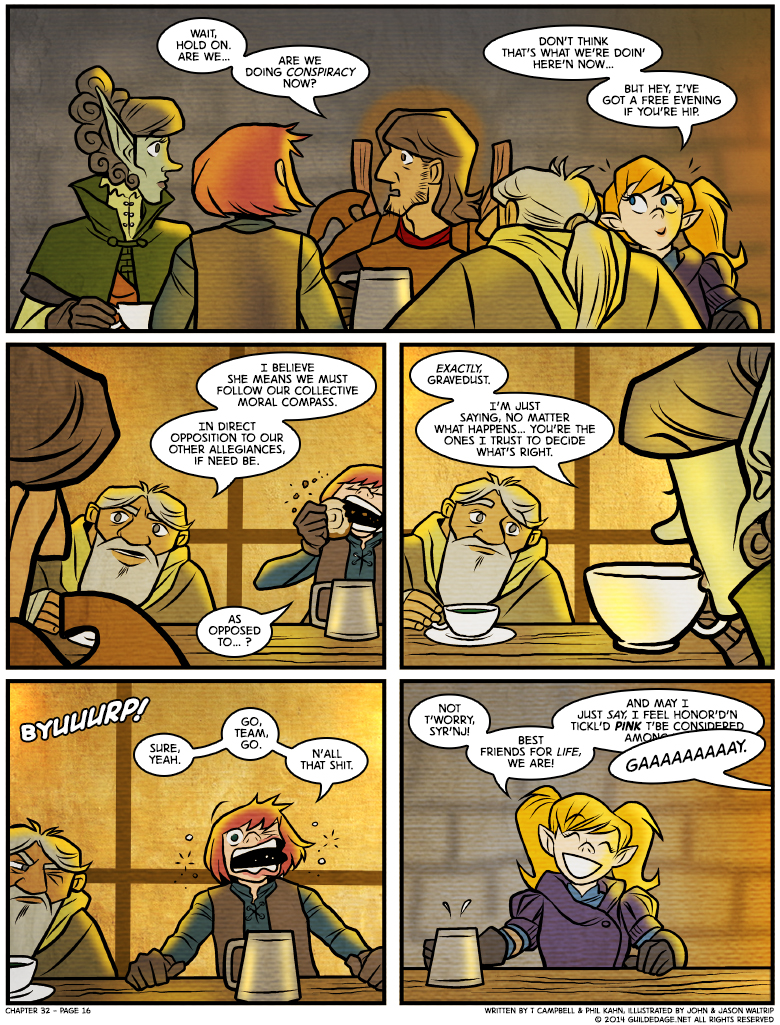Annotated 32-16
 Pitch #3 of 10: There’s no long-form genre more well-worn than the superhero comic, and superhero shows and movies are likewise commonplace. But there’s one medium where the superhero seems somewhat underrepresented: the infinite-canvas comic.
Pitch #3 of 10: There’s no long-form genre more well-worn than the superhero comic, and superhero shows and movies are likewise commonplace. But there’s one medium where the superhero seems somewhat underrepresented: the infinite-canvas comic.
“Infinite canvas,” if you’re new to the term, refers to Scott McCloud’s simple observation that a comic on the internet could be any size and shape, assuming an audience with a willingness to scroll. It could feature landscapes that went on for the equivalent of a city block, starscapes as long as your Facebook feed, epic differences of scale and detail. The main character of Traveler is more equipped than any other hero you know to navigate this awe-inspiring multiverse. But that doesn’t mean it’ll be easy.
Trevor’s principal powers are flight and teleportation, but he can move himself (and others) through time, parallel earths, and alternate dimensions as well as space, a fact he only learns through practice. His brief career as The Blip soon turns into an odyssey, and his quest to get back to his home seems futile for a while as he gets further and further away. Eventually, he starts mastering his powers and closing in, but by the time he gets back where he started, his concept of “home” might be fundamentally altered, as well as his concept of what it means to fight for justice. Life’s a journey. Celebrate the possibilities… and maintain a little healthy fear of them, too.











The pitch sounds cool. Although … I have come across a webcomic or two that were all too willing to make use of the infinite canvas, and found them sometimes tedious to read/scroll without good tools and guidance. (E.g. HUGE filesizes make things difficult!)
RE today’s comic, I share some of Byron’s concerns about a small but powerful group who decide among themselves to do what is “right”, regardless of things like the law; it reminds me a bit of the Altruist conspiracy (although those guys have the power to change the law itself). And the foreshadowing with Bandit is coming on strong here!
This whole scene has me crying because of Bandit.
I don’t get the “I’ve got a free evening, if you’re hip” line…
Just saying “No, we aren’t doing Conspiracy right now but I’m open to if you want” in a funny friendly kinda way.
“I’ve got a free evening” means she has time with no obligations and no plans already, at least not any serious ones, that she could use.
“If you’re hip” is older slang (I think American 60’s/70’s) meaning “If that’s the sort of thing you like” or “If you’re trendy enough”. Something like that. “Hip” itself can be analogous to the later “cool”.
“I’m so hip, I have trouble seeing over my pelvis.” Zaphod Beeblebrox
I do really love Frigg, btw., most particularly her burping face.
Friggin’ Frigg
Urch. I didn’t intend to open a thread, was meant as a reply …
See above
Infinite canvas thoughts…
I don’t think Scott really thought that one through, or did enough empirical research on it.
The problem is that human narrative comprehension is still essentially linear, and linear + fixed display size means definite limits to the size and shape of canvases we can actually enjoy.
Short of making your comic as an open-ended game, which would then make it no longer a comic, there’s really no way to implement it.
This is the problem with certain kinds of scientific investigation: Sometimes the tool used to inspect the subject matter is too powerful, meaning that you end up with results that pertain to some superdomain, rather than the narrow subject matter you investigated.
For many of Scott’s ideas, they ended up belonging to the superdomain of “Narrative”, rather than the much narrower domain of “comic-type narrative”… which means applications of his ideas may very well no longer actually be comics.
If you’re going to argue that McCloud’s ideas only apply to something other than comics, then you have to at least address that he began with a broad-based, holistic definition of comics himself, one that’s definitely accommodating to infinite canvas and various other forms. You might disagree, but after arguing with an old girlfriend over whether comics simply had to be funny by definition (“It’s in the name!”), it’s probably no surprise I prefer the definition that places the fewest possible limits on what we can do.
True infinity is unattainable, but true infinity was never the understood meaning of the term. There are many comics in existence now defined as “infinite canvas” to their creators’ and readers’ satisfaction, and they and I have enjoyed them just fine, not counting Fans and Guilded Age‘s own forays into the format. Seeing the whole canvas at once isn’t really the point, although I’ve seen a few that make that possible. The screen is considered a window, the reading lines are more open and flexible, and the images, freed from the constraints of newspaper dimensions or having to jigsaw into finished pages, can now stretch and interact in new ways.
(I also can’t see how turning it into a game would make it any less of a scroll-based experience. That one just confuses me.)
Obviously your mileage may vary and any format has some readers who don’t respond to it. Not everyone loves comic strips or page-a-day webcomics, either. But to say it empirically “doesn’t work” is a curious assertion. It may not have replaced strips or books, but with so much reading getting done on our phones these days, it’s probably a more relevant format than ever.
By making it into a game, I mean to provide automation or scripting of the transitions from event to event.
A narrative game is a game that tells a story, with reader choices or actions set to control the pace of the event, sometimes also the direction.
A movie is another option, but that would involve sacrificing more reader control.
But the point is that a narrative is composed of a number of events that influence each other.
There are narratives that include complete non-sequiturs, but they’re harder to get to work.
Some events unfold in parallel, in different places, but the fact that they need to influence each other means they still gotta be coordinated somehow.
But, I realize I just overthought it, going towards extremes not really necessarily intended.
Giving up on being able to print something is a toughie based on the kickstartery direction the culture has taken, but not something that’s impossible to overcome or work around.
If you haven’t heard of Webtoon (and others like it) as a platform by now, I recommend looking into it for the sake of reference.
Making “exploring the medium” into the premise of the work is likely to work well, but I’m not sure if it can be said to be unprecedented anymore – thanks to platforms like that, it has sort of been ongoing unintentionally for awhile, I think, in a variety of comic genres.
I feel that one weakness of the infinite canvas is that “infinite” only applies if your format (landscape or portrait, animated or not) is consistent throughout the entire production – otherwise it is an “interrupted” canvas, which works about as well for immersion as a panoramic collage (might be an interesting standalone artform, but I wouldn’t call it “literature” or even a graphic novel).
That’s all I have to say about this for now…
The first time I encountered the term “infinite canvas” must have been around 2005 or so, and that’s about when I also saw another experimental webcomic format thing, which was using a single panel in a Flash widget with forward/back buttons below so the next panel would show at the same spot, without reloading the page around it.
I’m really happy Flash isn’t around anymore but a bit sad that none of the webcomics I know have tried using the method. The cool thing about it is that you can make a quasi-animation. Because the panels are on top of each other, movements between one panel and the next are much more visible than if they were next to each other. I loved the effect.
Also, your pitch of a time/space/dimension-travelling superhero comic sounds cool. Says the guy who hasn’t even read most superhero comics because he finds them kinda boring. The thing that got me: Being away from home so long that it stops being home, and growing/learning so much in the meantime that the people who stayed behind don’t are no longer the peers they used to be.